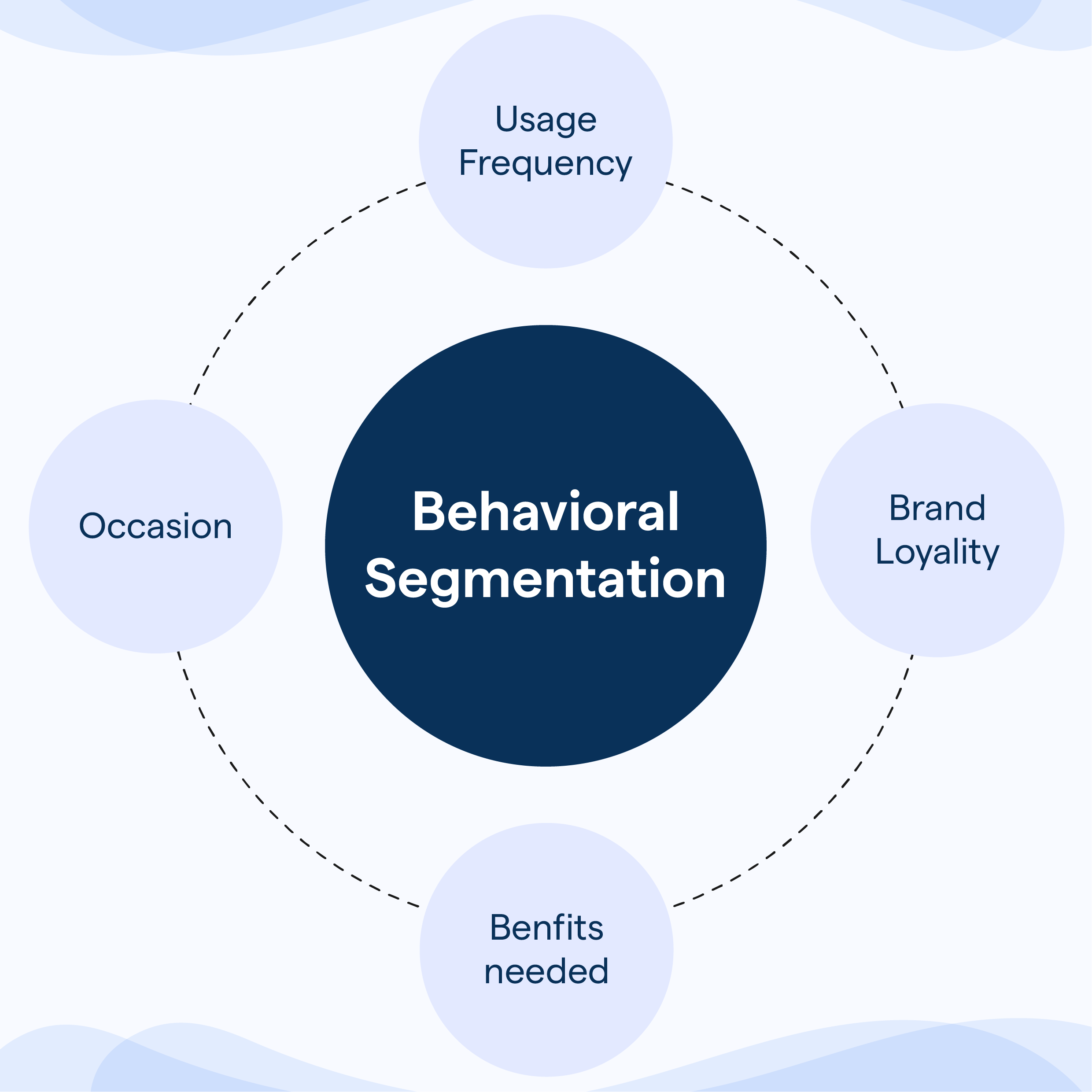What is Behavioral Segmentation?
It's key to understand the meaning before moving towards its various aspects - Behavioral segmentation is a marketing method that segments consumers according to their behavior towards products or services.
It's based on the actions they take, such as purchase history, usage, brand interactions, benefits sought, and more.
Definition
Behavioral segmentation technically means dividing your market based on consumers' behaviors, including the likes of usage, consumption, habits, and spent time.
The Basis of Behavioral Segmentation
The bedrock of this type of segmentation rests on the theory that a consumer's behavior regarding your product or service provides concrete and actionable insights regarding their requirements and the characteristics that drive their purchase decision.
Importance
Understanding customers' behaviors allows for personalized and more focused marketing efforts that resonate with specific consumer groups, thereby increasing the overall ROI.
Pillars of Behavioral Segmentation
Four main pillars underlie behavioral segmentation: purchase behavior, occasion and timing, benefits sought, and customer loyalty level.
Factors driving Behavioral Segmentation
These are also referred to as variables. Common factors include usage rate, commitment status, user status, purchase frequency, brand interactions, and more.
Who uses Behavioral Segmentation?
Who can make the most out of Behavioral Segmentation?
Let's find out - It's primarily beneficial to businesses, marketers, and researchers who aim to understand consumer patterns and shape their marketing strategies accordingly.
- Businesses: Enterprises, irrespective of their scales, can implement Behavioural segmentation to understand their target audience better, customize the product or services, and enhance their marketing message resulting in better sales.
- Marketers: Marketing managers or executives can make use of these consumer insights to make data-backed decisions and strategies for targeting.
- Market Researchers: It acts as a tool for researchers to understand consumer behavior and enables them to predict future behaviors.
- E-commerce Platforms: Online retailers can use behavioral segmentation to provide personalized experiences to customers which resultantly increases their engagement and conversion rates.
- Content Creators and Advertisers: By understanding how their audience behaves, content creators and advertisers can create more relevant and appealing content and ads.
Where is Behavioral Segmentation Used?
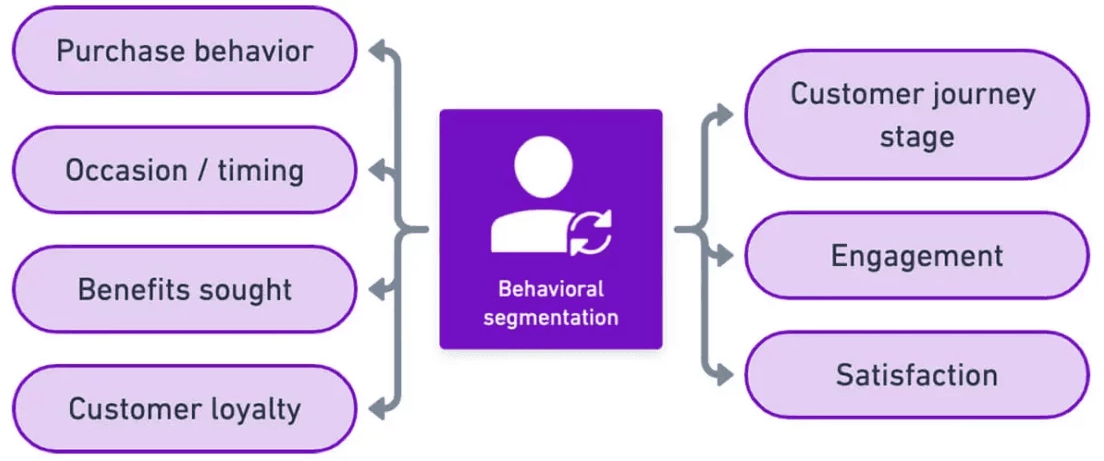
An insight into the places where Behavioral Segmentation finds its application - It is implemented across industries such as retail, e-commerce, media, telecommunications, and more.
- Retail: Brick-and-mortar stores utilize behavioral segmentation to personalize the shopping experience, from product placement to the overall store layout, based on shopping behaviors.
- E-commerce: Online shoppers’ behavior is tracked to tailor suggestions, offers, and overall shopping experience.
- Media and Entertainment: Platforms like Netflix or Spotify use behavioral segmentation to analyze viewer/listener behavior and recommend personalized content accordingly.
- Telecommunications: Telecom companies use behavioral segmentation to offer better tailored plans and packages based on usage patterns.
- Health and Wellness: Fitness or health companies can use behavioral segmentation to offer personalized goals, reminders, or recommendations based on individual habits.
When to Implement Behavioral Segmentation?
Understanding the right time to implement this technique is crucial for it to offer the desired results—when you notice distinct behavior patterns among your customers that correlate with different purchase habits or preferences.
- New Business: When launching a new business, apply it initially to understand your customer base and target your marketing effectively.
- New Product Launch: Segment different target groups based on how they might interact with the new product.
- Identifying Marketing Efficiencies: If your marketing strategies are not providing the expected results, applying behavioral segmentation could help you understand why and how to improve.
- Increasing Customer Retention: If you're struggling with losing customers, behavioral segmentation can help you understand the reasons behind their churn.
- Enhancing Customer Experience: This is the line of action if you aim to personalize your interaction with customers, to elevate their experience with your brand.
Why Use Behavioral Segmentation?
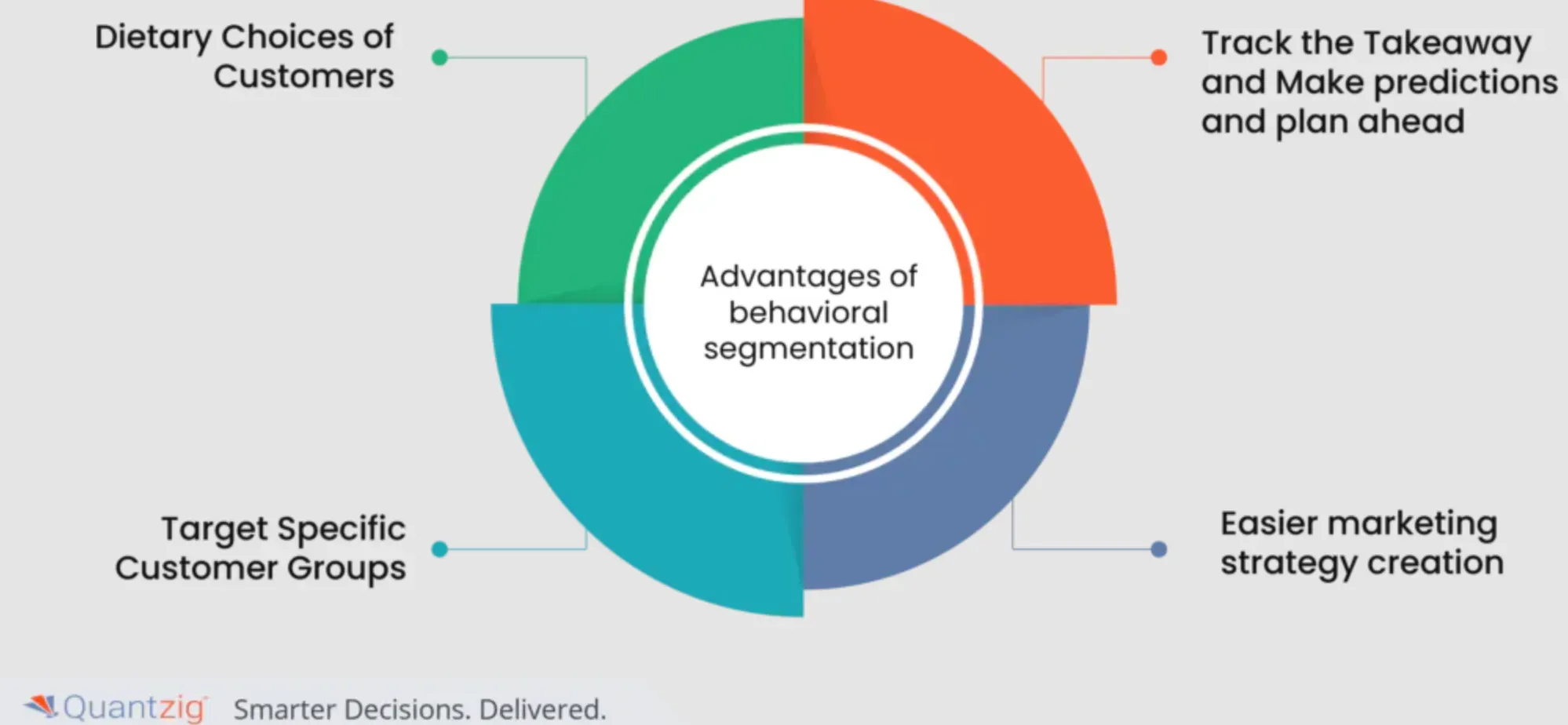
Let's delve into the reasons that make this technique advantageous - The benefits include increased marketing effectiveness, customer retention, personalized customer experience, customer engagement, and profitability.
- Increased Marketing Efficiency: By tailoring your messaging to specific behavioral groups, you increase the chances of your message being heard and acted upon.
- Enhanced Customer Retention: Understanding and catering to the behaviors and preferences of your customers can increase their satisfaction and loyalty toward your brand.
- Elevated Customer Experience: Behavioral segmentation allows you to customize your customer’s experience with your brand, product, or service, which can evoke positive emotions and strengthen customer relationships.
- Boosted Customer Engagement: By understanding your customer's behavior, you can engage them more effectively through personalized communications and offers.
- Greater Profitability: With increased marketing effectiveness and customer retention, your business can generate more profits. By addressing your customers’ specific needs, you increase your chances of making a sale.
How is Behavioral Segmentation Implemented?
The operational aspect of this technique involves data collection, analysis, creation of segments, and implementation.
- Data Collection: Data collection encompasses a wide range of data points collected through various sources like customer surveys, purchase histories, social media analytics, customer feedback, etc.
- Analysis: Once the data is collected, it's analyzed to identify patterns and correlations in customer behaviors.
- Segment Creation: Based on the data analysis, segments are then created grouping customers who display similar behavioral patterns.
- Implementation: The information from these groups is then used to customize marketing approaches and improve products or services for each respective group.
Best Practices for Behavioral Segmentation
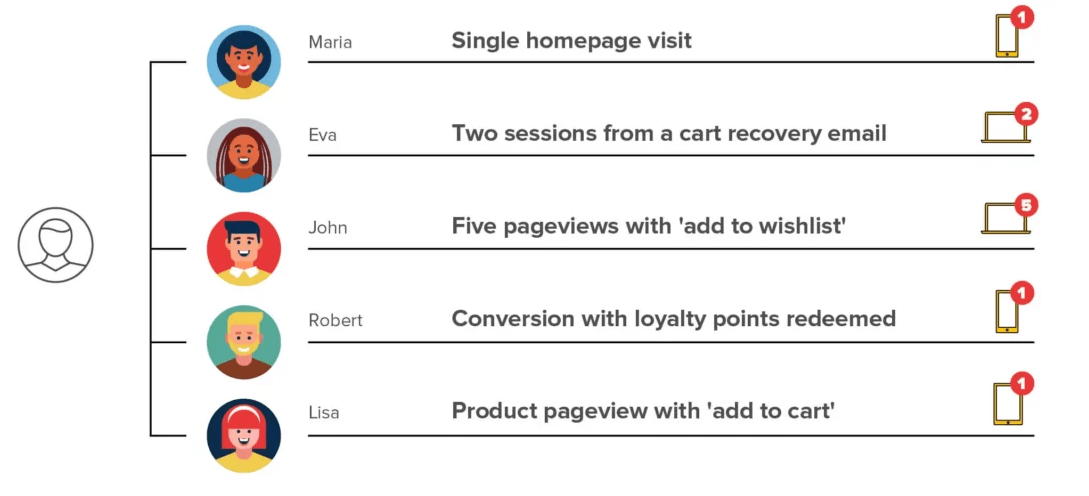
Here are some pro tips to make the most out of this beneficial marketing practice.
Constant Monitoring
The nature of consumer behavior can change over time. Regularly checking and updating your segments based on new data can keep your marketing efforts relevant.
Combine with Other Types of Segmentation
While behavioral segmentation is powerful, it can be bolstered by combining it with demographic, psychographic, and other segmentation types.
Start from a Broad Scope
When you start segmenting, it's better not to dive too deeply from the start. Begin with broader segments and narrow down as you learn more about your customers.
Test and Iterate
Test your segments before implementing strategies on a larger scale to ensure they produce the desired results. Learn from the results and refine your segmentation.
Keep Privacy in Check
While collecting behavioral data, be mindful of privacy concerns. Always respect and protect consumers' privacy rights.
Challenges in Implementing Behavioral Segmentation
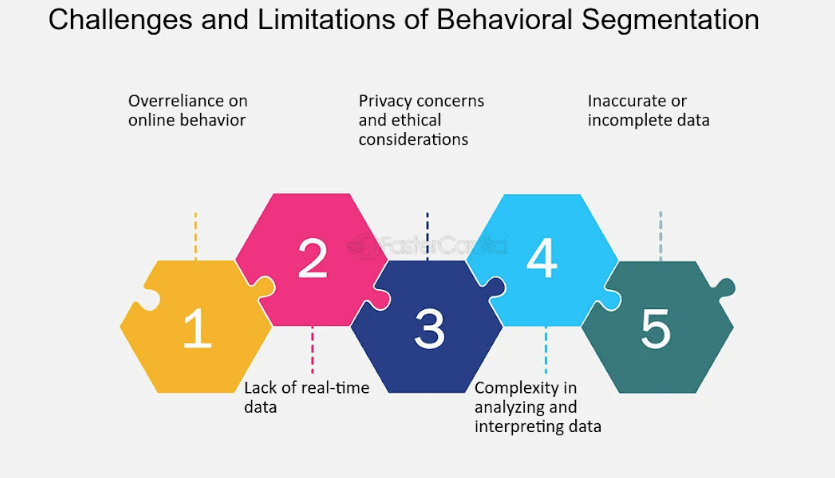
While advantageous, Behavioral Segmentation comes with its own set of challenges. Awareness about these issues can lead to better preparation and effective solutions.
- Data Collection: Collecting granular and accurate data for behavioral segmentation can be challenging. Companies must ensure they are sourcing high-quality and diverse behavioral data.
- Data Analysis: Analyzing large volumes of data can be time-consuming and require significant technical skills.
- Lack of Standard Behavioral Categories: Different industries and companies might require different categories that could be challenging to identify and implement.
- Resistance to Change: Internal quality assurance can be daunting as employees might resist the changes resulting from new segment-based strategies.
- Privacy Concerns: While collecting behavioral data, privacy issues may arise that can pose significant barriers if not managed properly.
Current Trends in Behavioral Segmentation
Understanding the current trends of Behavioral Segmentation brings updated knowledge and can help you stay ahead of your competition.
Personalization Powered by AI
AI is enabling more detailed behavioral segmentation analyzed at a granular level, powering personalized marketing experiences like never before.
Predictive Behavioral Segmentation
Utilizing big data and machine learning, businesses can now predict future consumer behavior and strategize accordingly.
Omni-channel Behavioral Segmentation
Brands are utilizing behavioral segmentation across all channels of customer interaction to provide a seamless and consistent customer experience.
Real-time Behavioral Segmentation
Companies are now implementing real-time behavioral segmentation to respond to customer behavior immediately, offering enhanced personalization.
Ethical Behavioral Segmentation
With growing concerns surrounding data privacy, ethical behavioral segmentation that respects customer privacy while gaining behavioral insights is becoming the norm.
Frequently Asked Questions (FAQs)
What Metrics are Key in Behavioral Segmentation?
Key metrics include purchase behavior, user status, engagement levels, and the frequency of interaction with a brand or product.
How Does Behavioral Segmentation Improve Targeted Marketing?
It tailors marketing strategies to consumer behaviors, creating more relevant campaigns that resonate more deeply with each segment.
Can Behavioral Segmentation Aid in Product Development?
By understanding different behaviors, companies can design or modify products to better suit the preferences of specific market segments.
What's the Impact of Behavioral Segmentation on Customer Loyalty?
Behavioral segmentation can lead to personalized experiences that improve customer satisfaction and loyalty.
How Are Behavioral Segmentation Strategies Evolving with Technology?
Advancements in data analytics and AI enable more precise behavioral segmentations, predicting patterns and automating targeted marketing actions.
